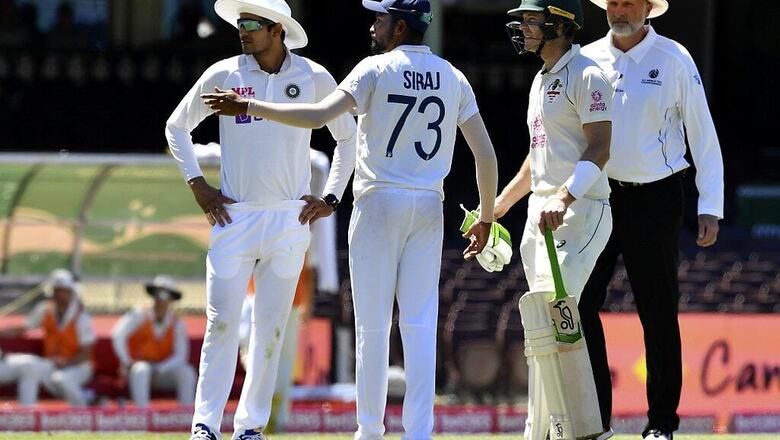
views
Cricket can be such a bittersweet game. During the third Test match at the Sydney Cricket Ground between India and Australia, we experienced the sweetness of great courage by both sides, and the contrasting bitter taste when someone in the crowd directed racist remarks at an Indian player. The best and the worst of humanity.
For an Australian like me, it was inspiring to see the Indian cricketer, Mohammed Siraj, take a stand against the abuse and then uplifting to hear Australian captain Tim Paine describe the abuse as “bitterly disappointing”. Paine then won hearts by joining the Indian team’s huddle on Sunday, saying he did so to “make sure that the visitors knew that he and his team were against any sort of abuse”. This is powerful symbolism.
Also important was the expulsion of six suspects from the ground. Charges are on the way.
Most countries have anti-racism laws, but why is racism so hurtful?
My grandmother taught me the childish nursery rhyme of “sticks and stones may break my bones, but words will never hurt me”. But I never fully believed it then – it seemed to me that words did hurt. Her intention of course was to help make me strong when others verbally lashed out, and I thank her for that.
We now know that words do hurt – racism has a devastating impact on the individuals who are the victims of it. A study of over 800 Australian secondary school students found that racism had huge mental health impacts on young people who experience it.
This mental damage can include ongoing feelings of sadness, anger, depression and being left out.
Physically it can lead to headaches, increased heart rate, sweating, trembling and muscle tension.
Can you imagine being a victim, living with a constant fear of being verbally or physically attacked at any time?
Many such children do not want to go to school and finish up having little or no trust in anybody apart from family. For these individuals, we must oppose racism.
Racism also hurts our communities.
By creating a society where people don’t trust and respect each other, racism unchecked could defeat our efforts to live well together and to prosper as democracies. India and Australia are two of the world’s great democracies where trust and respect are central to successful communities. When trust and respect decline, so too does the strength of our democratic institutions.
When racism is allowed to flourish, it lessens us as a people and as communities. Further, we can see that racism is like a personal assault on individuals and like an attack on our community values. It is an idea alien to basic human rights for the very reasons that, for individuals, words do hurt, and for communities, words can divide us.
Australia actively promotes the concepts of multiculturalism and tolerance for the very good reason that these values keep us stronger together.
We also have to promote respect and tolerance because we are a nation of diverse peoples – one in four of Australia’s 24 million people were born overseas; 46 per cent have at least one parent who was born overseas; and nearly 20 per cent of Australians speak a language other than English at home.
We are also home to the world’s oldest continuous culture, as well as Australians who identify with more than 270 ancestries. Since 1945, almost seven million people have migrated to Australia. This rich, cultural diversity is one of our greatest strengths. Racism seeks to undermine that strength.
My experience as a regular attendee at the Melbourne Cricket Ground provides evidence of this Australian commitment against racism. Signage provides contact numbers to call or text if any individual is using offensive language of any kind. I have seen the system at work – on one occasion I quietly reported an offender to security who walked the person out of the stadium.
When racial tensions develop, they don’t just affect one or two of us – they affect us all… as neighbours, workmates, friends and fellow Australians. In fact, racism hurts all people on this small planet, because living peacefully together is central to our future.
Mahatma Gandhi pursued Indian independence with non-violence and his comments then can help us now: “The very first step in non-violence is that we cultivate in our daily life, as between ourselves, truthfulness, humility, tolerance, loving kindness.”
If racism occurs, we have to find the courage of Indian cricketer Mohammed Siraj to call it out, and the sensitivity of Australian skipper Paine to condemn it and side with the victim.
Once again, in an important way, cricket has shown us how to behave. Let’s all take a strong stand against racism.
(Stephen Manallack is the Chairman of the Genesis India-Australia Horticulture Project, a blogger at INTO INDIA and is a former President of the Australia India Business Council (Vic). Views expressed are personal.)
Read all the Latest News, Breaking News and Coronavirus News here




















Comments
0 comment